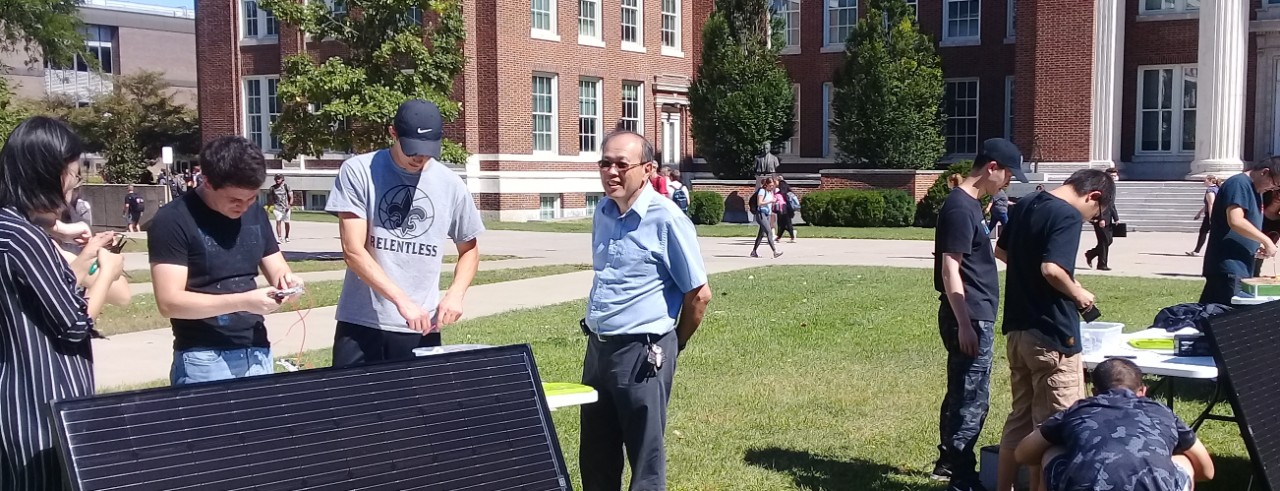
Solar energy course gives students a head start in renewable power industry
UC earns approval from national board to offer solar energy training and exam
The renewable energy market is on the rise and so are employment opportunities in the sector. Students at the University of Cincinnati can take a course on photovoltaic (PV) electric energy, which gives them the opportunity to take a nationally recognized exam for certification in solar energy.
The new course, which launched for the fall semester 2019, is taught by Fred Chiou, an electrical engineering professor in the College of Engineering and Applied Science, who is part of the Solar Instructor Training Network, a partnership between the U.S. Department of Energy and the U.S. Departments of Labor and Education.
Students who complete the Photovoltaic Electric Energy (ELTN 4059C) course are then eligible to take the North American Board of Certified Energy Practitioners (NABCEP) PV Associate Exam. UC’s Department of Electrical Engineering and Computer Science was recently approved as an official registered training and exam provider by NABCEP.
“If students complete our course and pass the exam, it will be evidence that the students are knowledgeable and skillful in this area,” Chiou said. “They will be more competitive in the job market of the solar photovoltaic industry. Students will gain a solid background to move forward if they would like to develop their career in this area.”
The course teaches the fundamental principles of the application, design, installation and operation of solar photovoltaic systems. Students also learn about the markets and applications of solar energy. Hands-on labs are often conducted outside to harness the power of the sun. Undergraduate or graduate students of any major may take the course if they have completed one of the following: EECE 2070/EECE 2070L – Electronics I and lab (minimum C-) or ELTN 2003C – Electronics (minimum C-).
Daniel Suarez, an electrical engineering master’s student, was one of 26 students who took the first offering of the course. He also elected to take the certification exam.
“The class allowed me to obtain a solid foundation in the field of solar energy as well as to understand the importance of alternative energy sources in order to help the environment,” Suarez said.
Suarez’s field of study centers on power engineering. The course is a valuable addition to his education and his resume, he said.
“Power generation is very important in the field of electrical engineering and I believe having the chance to build suitable concepts not only on solar energy but also in design and implementation of PV systems is outstanding. I enjoyed every minute of the course and I look forward to learning more about the topic,” Suarez said.

UC College of Engineering and Applied Science students work on a solar panel. Photos provided.
Related Stories
Quo family establishes $1M endowed professorship at UC to honor...
October 2, 2025
The University of Cincinnati College of Engineering and Applied Science (CEAS) has received a $1 million gift from the family of long-time faculty member Phillip C. Quo and his wife Consuelo Y. Quo.
Engineering alumnus builds 'house of brands'
October 2, 2025
For alumnus Ben Moore, the University of Cincinnati legacy is strong. His father, himself, and his children are all Bearcats. Earning a degree in electrical engineering, Moore found an untapped passion for mentorship while in school. Upon graduation, he went on to start his own business while working in industry. Today, he owns several businesses in the Cincinnati area.
UC joins national mental health initiative for college students
September 29, 2025
The University of Cincinnati has joined a national program aimed at strengthening mental health support for college students, becoming an official JED Campus as part of the university’s long-standing commitment to supporting student well-being. The JED Campus program, developed by the nonprofit Jed Foundation, helps colleges and universities evaluate and enhance their mental health, substance misuse, and suicide prevention efforts. The initiative guides schools through a four-year strategic process to build comprehensive systems of care.
